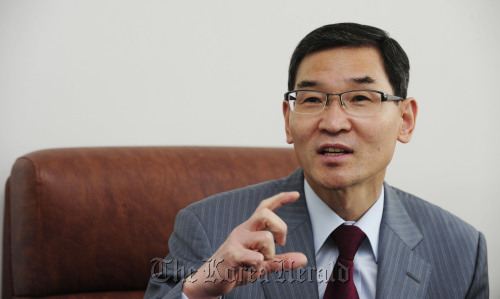State-run agency KEITI leads drive to promote environmental exports
Korea may not be the most advanced in green technologies, or the most politically committed to carbon reductions. But that does not mean it cannot be a leader in the global environmental industry, said Yoon Seung-joon, a long-time environmental official now heading a state-run institute on the green industry.
“Korea, as a country that has undergone a rapid industrialization and urbanization and struggled to fix their many side effects on the environment, has a story to share with other countries,” the president of Korea Environmental Industry & Technology told The Korea Herald.

KEITI president Yoon Seung-joon
“And we, the KEITI, are at the vanguard of the efforts to spread Korea’s experience and know-how to under-developed or developing countries, be it in the form of an official governmental aid or profit-seeking activities by domestic enterprises,” he said.
The 55-year-old Yoon took charge of the KEITI in August 2011, after nearly 25 years of service at the Environmental Ministry.
Established in 2009 by the merger of two governmental bodies, the KEITI’s roles and responsibilities span a broad spectrum ― from support of green R&D to commercialization of green technologies to eco-labeling.
Among the many undertakings of the KEITI, Yoon takes particular pride in a program to devise an environmental roadmap for under-developed or developing countries free of charge.
The project envisions a team of Korean specialists, including private sector representatives, devising a tailored strategy and implementation plans to tackle the most pressing environmental problems of a recipient country.
Costs incurred during the process, which usually takes about 10 months to a year, are covered by the KEITI.
Since the program’s inception in 2007, nine countries ― from Vietnam in Asia to Mozambique in Africa ― have benefited from it.
This year, three more countries ― Bangladesh, Chile and Peru ― have signed up for the service and are currently discussing the details of the program.
“The Master Plan is gaining momentum and is proving to be a very efficient tool for Korea in terms of both official development assistance as well as business opportunities,” Yoon said.
A 2009 case in Azerbaijan is an example of how the master plan project works.
A team of Korean specialists, after 10 months of fieldwork and study, proposed the Azerbaijani government a set of projects to improve its sewerage and waste water treatment system and urban air quality.
The Korean government, through its official aid arm, committed a $26.18 million grant to finance one of the proposed works in the former Soviet republic.
Later, Halla Energy & Environment Co., one of the private firms which participated in the formation of the roadmap, landed a 23.6 billion won deal to construct the sewage and fresh water pipeline networks in the country.
The nine already-concluded programs resulted in contracts worth 160 billion won for domestic firms, including Halla. The sum is expected to rise sharply in the coming months, as more deals of far greater amounts are in the making.
“Western countries may provide better solutions, but it seems to me that Korea’s technologies and know-how are just about the right level for some countries, in terms of their sophistication and cost-effectiveness,” Yoon said.
“Not every person on the planet needs a smart phone. For some, a handset with simpler functions and a cheaper price tag may be the ideal,” he said. “After all, best products are not always the best-selling ones.”
Data backs Yoon’s belief that Korea could carve a niche in the global green industry.
The total overseas contracts clinched by local environmental firms with the support of the KEITI have jumped five-fold in the past three years to 322 billion won in 2011. In 2008, the export amount stood at 51.8 billion won.
Going forward, the KEITI aims to achieve 440 billion won in exporting contracts this year and break the 1 trillion won mark by 2017.
The KEITI’s drive to bolster green exports is part of a national effort to turn Asia’s fourth-largest economy greener.
The Environmental Ministry plans to spend 1.5 trillion won over the next decade to foster eco-friendly industries into a new export driver for the economy.
By Lee Sun-young (milaya@heraldcorp.com)






